Wanted: A Runner with Soul
In a parking lot of Tel Aviv, in the cold winter predawn darkness of 2005, Offer and Gai Ben Dor, father, and son, waited expectantly for a meeting. Both Offer and Gai, seasoned long distance runners, had come to volunteer in response to an internet ad which read "Wanted: A Runner with Soul!" The sender was Beza, a young Ethiopian-born Israeli in his early twenties. Blind from birth and deserted by his father, Beza at the age of seven had immigrated with his mother to Israel. He now wished to fulfill his long-held dream of becoming a runner.
The mission was a daunting one for them all. Gai recalls: "Here in front of us was someone of my age who was completely physically unfit, who could barely run twenty meters. Not only that, but he was a heavy smoker too! To achieve any result involves a grueling regimen of daily runs often in inclement weather that demands physical stamina and mental discipline, so we knew that a long road lay ahead of us."
A blind runner needs a companion attached to him by a short strap with wrist loops to run beside him/her. With the passing of time, a closeness and comradeship evolve where the two runners can sense each other's status and needs. Being the eyes of the blind person, the sighted runner, moreover, develops the sensitivity to perceive any obstacles that might hinder his/her partner's physical progress – something a sighted runner takes for granted.
With the passing of time, Beza's determination, combined with the love and dedication of the Ben Dors, began to pay dividends. After graduating from 5 to 10 kilometer runs, they ran 21 kilometer half marathons. From there, they naturally advanced to the full marathon – an exhausting 42.2 kilometers. Beza had heard that the Paralympics were to take place in Beijing in 2008 and expressed his eagerness to take part in the marathon. There was only one obstacle – you had to be in the global top 30 of blind runners as well as having a minimum qualifying time to earn a place. Beza was very far from it.
With this goal in sight, all three of them started training in earnest and participated in overseas events. Failing to achieve the desired result in the Berlin Marathon, they had one last chance at the forthcoming event in Amsterdam. Gai recounts: "We were close to the finishing line and looking at my watch, I realized that we were going to make it. I unfurled the Israeli flag in my pocket and with tears of joy, together we crossed the finishing line – Beijing awaited us."
The Beijing Marathon was arduous. Beza sustained a leg injury and was flagging. But, with the constant support of Offer and Gai, he persevered. Entering the stadium for the final lap, the roars of encouragement of the 91,000 spectators infused him with fresh strength. They released the wrist strap and Beza ran alone and unaided for the last 30 meters to the finishing line!
Fresh from his accomplishment and with Nepal not far away, Beza expressed a further wish – to climb Mount Everest! Once more, all three of them accepted the challenge and made the climb of 5,500 meters all the way to the base camp. Gai recalls the difficulties encountered: "You not only have to cope with the difficulty of breathing in the oxygen depleted air, but have to deal with guiding the blind person over rocks, crossing rivers and traversing crevasses". Upon finally reaching the base camp, an exultant Beza exclaimed: "The view here was worth the climb!"
Helping Beza achieve so much had been an enlightening and transformative experience. Returning home, Gai decided to help other handicapped people. In addition to his studies, Gai became a running instructor to help disabled people through sport.
In 2016, Gai, together with his wife Adi and his parents Offer and Orit, decided to promote their vision by founding the social organization known as 180°. 180° strives to empower and promote the social integration of people with disabilities and special needs through sports and educational programs.
Since its inception. 180° has gone from strength to strength. It now runs many groups that have participants of all ages from both genders, irrespective of their backgrounds. Each of the groups is headed by a qualified running instructor. Each participant has his/her own permanent volunteer. This approach is mutually beneficial as a bond develops between the participant and the volunteer. The volunteer gains greater empathy and understanding while helping the partner to gain self confidence and belief in his/her ability.
Gai and Adi are aware that, in sports, those with disabilities are very often not granted the same opportunities as others. A lack of the appropriate framework, connected to a lack of understanding of their needs, and, very often, social exclusion leads them to lose faith in their own abilities. The founding of 180° created a framework that brings people together. Through sports, it has helped those who are physically less advantaged and those with special needs to attain greater self esteem and consequent self-actualization.
A few years ago, Gili joined the group. With a severe case of cerebral palsy and confined to a wheelchair, his main physical exercise had been limited to manipulating the joystick. Nevertheless, Gili's dream was to be able to walk. With the aid and dedication of Gai and his volunteers, he began to stand on his own feet and progress. After two years of practice, with support on both sides, he completed a 5 km walk at a special event in Berlin. "Helping Gili was physically demanding but seeing the finishing line approaching and crossing it with him was intensely satisfying and a profoundly moving experience, for us all!"
Another project of 180° that is close to Gai's and Adi's hearts has been the initiative to establish 180° Education - running groups in elementary schools designed to inculcate in young people the values of tolerance, understanding, and helping others less fortunate. Handicapped children are teamed up with classmates to train together in preparation for athletic events. By so doing, the helper learns empathy by aiding a partner and facilitating his/her social inclusion.
Gai states: "I truly believe that when people are doing sports activities together, they go through a process that creates a relationship and removes the barriers between them. I also believe that sports help people to develop self confidence, a sense of their own ability and higher self esteem!" What a wonderful way of making our world a better place.
180°organization's website address is https://www.180sport.org/en



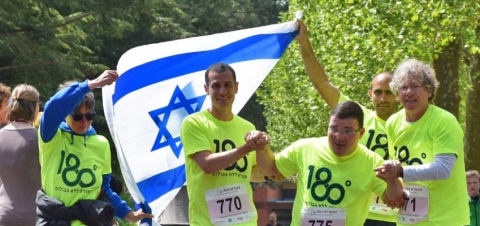
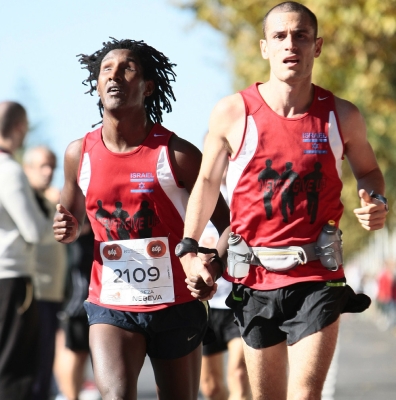
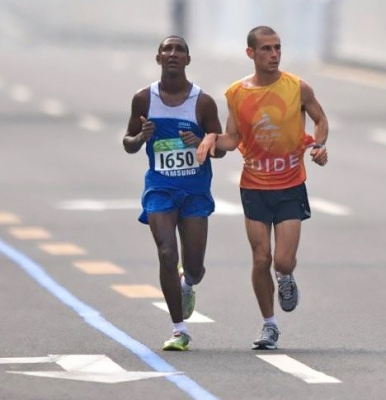
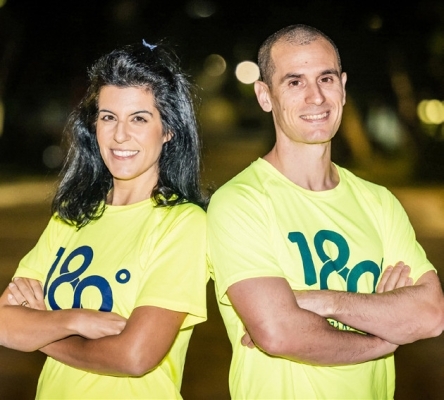
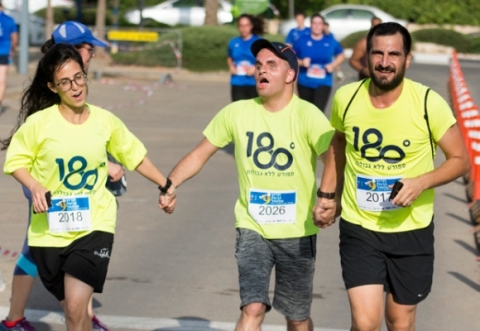




Comments